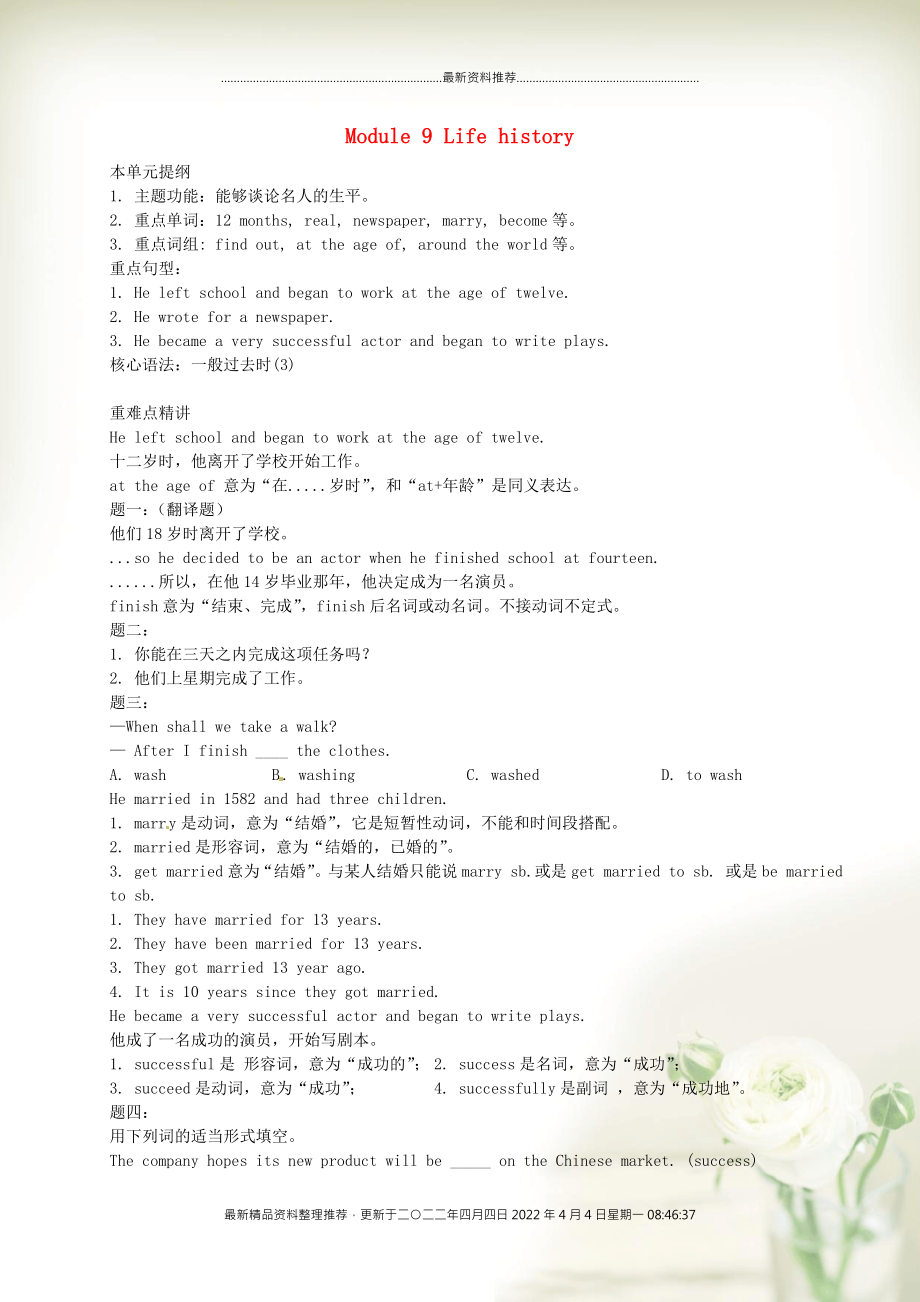《北京市七年級(jí)英語(yǔ)下冊(cè) Mudule 9 Life history專題講解 (新版)外研版》由會(huì)員分享�,可在線閱讀,更多相關(guān)《北京市七年級(jí)英語(yǔ)下冊(cè) Mudule 9 Life history專題講解 (新版)外研版(4頁(yè)珍藏版)》請(qǐng)?jiān)谘b配圖網(wǎng)上搜索�。
1、……………………………………………………………最新資料推薦…………………………………………………
Module 9 Life history
本單元提綱
1. 主題功能:能夠談?wù)撁说纳健?
2. 重點(diǎn)單詞:12 months, real, newspaper, marry, become等��。
3. 重點(diǎn)詞組: find out, at the age of, around the world等����。
重點(diǎn)句型:
1. He left school and began to work at the age of twelve.
2. He wrote f
2、or a newspaper.
3. He became a very successful actor and began to write plays.
核心語(yǔ)法:一般過(guò)去時(shí)(3)
重難點(diǎn)精講
He left school and began to work at the age of twelve.
十二歲時(shí)�����,他離開(kāi)了學(xué)校開(kāi)始工作����。
at the age of 意為“在.....歲時(shí)”����,和“at+年齡”是同義表達(dá)����。
題一:(翻譯題)
他們18歲時(shí)離開(kāi)了學(xué)校。
...so he decided to be an actor when he finish
3����、ed school at fourteen.
......所以�,在他14歲畢業(yè)那年,他決定成為一名演員�����。
finish意為“結(jié)束����、完成”,finish后名詞或動(dòng)名詞�����。不接動(dòng)詞不定式����。
題二:
1. 你能在三天之內(nèi)完成這項(xiàng)任務(wù)嗎���?
2. 他們上星期完成了工作。
題三:
—When shall we take a walk?
— After I finish ____ the clothes.
A. wash B. washing C. washed D. to wash
He married in 1582 and had three ch
4��、ildren.
1. marry是動(dòng)詞���,意為“結(jié)婚”�,它是短暫性動(dòng)詞�����,不能和時(shí)間段搭配����。
2. married是形容詞,意為“結(jié)婚的�����,已婚的”����。
3. get married意為“結(jié)婚”��。與某人結(jié)婚只能說(shuō)marry sb.或是get married to sb. 或是be married to sb.
1. They have married for 13 years.
2. They have been married for 13 years.
3. They got married 13 year ago.
4. It is 10 years since they got
5�、 married.
He became a very successful actor and began to write plays.
他成了一名成功的演員��,開(kāi)始寫劇本�����。
1. successful是 形容詞�,意為“成功的”; 2. success是名詞����,意為“成功”���;
3. succeed是動(dòng)詞�����,意為“成功”�; 4. successfully是副詞 ����,意為“成功地”�。
題四:
用下列詞的適當(dāng)形式填空����。
The company hopes its new product will be _____ on the Chinese market. (success)
Str
6、atford is a historic town and well worth visiting for a taste of Old England.
斯特拉福德是一個(gè)具有歷史意義的城鎮(zhèn)�,很值得游覽,你能從中體會(huì)到古英格蘭的感覺(jué)。
be worth doing sth. 意為“值得做某事”��,是固定搭配�����。
題五:(翻譯題)
這本書(shū)值得閱讀���。
題六:
—Would you like to watch the movie?
— Sure, let’s go. It’s my favorite movie. It is worth_______.
A. watch B.
7�����、 watches C. to watch D. watching
join , take part in
“join” 意為“參加”���,指加入某個(gè)團(tuán)體或組織,從而成為其中的一員����,其后常加表示黨派或團(tuán)體的名詞�。
“join in+某活動(dòng)”表示參加某項(xiàng)活動(dòng)����,多指參加正在進(jìn)行的活動(dòng),如競(jìng)賽���,娛樂(lè)�,談話等�,相當(dāng)于take part in.
take part in意為“參加”指參與會(huì)議或群眾性活動(dòng)等,著重說(shuō)明句子主語(yǔ)參加該項(xiàng)活動(dòng)并在活動(dòng)中發(fā)揮作用��。
題七:(翻譯題)
1. 瑪麗上學(xué)期加入了游泳俱樂(lè)部�。
2. 上周你參加英語(yǔ)聚會(huì)了嗎?
find, find out
“
8��、find”表示發(fā)現(xiàn)找到���。多用于表示找到具體的東西,如鑰匙��,書(shū)包等�����。
“find out” 表示發(fā)現(xiàn)查明,多用于表示查明某種真相或事實(shí)�����,即抽象的東西���。
題八:(翻譯題)
1. 他們?cè)跁?shū)包里找到了我的鑰匙����。
2. 沒(méi)有人能查明真相��。
題九:
They went to the information desk to ___ when the train would arrive.
A. look for B. look C. find out D. find
die, dead, death
“die”是不及物動(dòng)詞��,意為“死�;去世”,是短暫性動(dòng)詞��。若表示“死
9����、了多長(zhǎng)時(shí)間”要用be dead。
“dead”是形容詞�����,意為“死的,去世的”���。
“death”是名詞��,意為“死����,死亡”����。
題十:(翻譯題)
1. 那位老人去年去世了。
2. 那個(gè)男孩的爺爺去世兩年了��。
3. 我們?yōu)樗麄兊乃劳龆械诫y過(guò)���。
be famous for和be famous as
1. be famous for 后跟出名的原因�。
2. be famous as 后跟出名時(shí)的身份或者地位等��。
題十一:(翻譯題)
1. 周杰倫以他的歌而出名����。
2. 姚明以一位有名的籃球運(yùn)動(dòng)員而出名。
答案:
1. Jaychou is famous for his song
10�����、s.
2. Yaoming is famous as a basketball player.
一般過(guò)去時(shí)的一般疑問(wèn)句
句型:Did+主語(yǔ)+動(dòng)詞原形+其他���?
題十二:(翻譯題)
1. 上周他打籃球了嗎���?
2. —她去那里了嗎?
—是的��,她去了���。/不����,她沒(méi)去����。
能力提升與拓展
題十三:
Chi Li is one of the best-known Chinese writers. She was born in 1950s. 1 19, Chi entered a medical college in 1976. After she graduated, sh
11、e 2 as a doctor at a hospital in Wuhan. As she loved 3 much more, she went to Wuhan University to study Chinese language and literature in 1983. She chose 4 as her profession(職業(yè)).
During the 1980s, Chi wrote many works full of love. In the 1990s, her works, such as Apart From Love and
12����、The Sun Was Born, were 5 life of young people and everyday problems. Since 2003, Chi has 6 a higher level in her works. And many of her novels have received 7 honor. Life Show is one of her representative works. and 8 has been translated into many languages. The 9 shows
13����、the real life of a common woman in Wuhan.
Chi says, “Writers don’t need to be some one else, 10 they should be able to understand everyone.” So she often travels alone to feel the world and tries to understand all kinds of people.
1. A. At the age of B. At the moment C. In the beginni
14�、ng D. At last
2. A. became B. worked C. enjoyed D. lived
3. A. medicine B. traveling C. literature D. music
4. A. teaching B. writing C. nursing D. singing
5. A. over B. under C. about D. with
6. A. reached
15、 B. arrived C. went D. got
7. A. great B. terrible C. bad D. nice
8. A. she B. they C. it D. us
9. A. picture B. story C. newspaper D. song
10. A. or B. till C. but D. so
16���、
Module 9 Life history
講義參考答案
重難點(diǎn)精講
題一: They left school at the age of 18.
題二:1. Can you finish the task/work in 3 days. 2. They finished the work/doing the work last week.
題三:B 題四:successful 題五:This book is worth reading. 題六:D
題七: 1. Mary joined the swimming c
17��、lub last term. 2. Did you take part in the English party last week���?
題八: 1. They found my keys in my schoolbag. 2. No one can find out the truth.
題九:C
題十: 1. That old man died last year. 2. That boy’s grandfather has been dead for two years. 3. We feel sorry for their death.
題十一1. Jaychou is famous for his songs. 2. Yaoming is famous as a basketball player.
題十二:1. Did he play basketball last week?
2. —Did she go there�����?
—Yes, she did./No, she didn’t.
能力提升與拓展
題十三:1-5ABCBC 6-10AACBC
最新精品資料整理推薦�����,更新于二〇二二年四月四日2022年4月4日星期一08:46:37
 北京市七年級(jí)英語(yǔ)下冊(cè) Mudule 9 Life history專題講解 (新版)外研版
北京市七年級(jí)英語(yǔ)下冊(cè) Mudule 9 Life history專題講解 (新版)外研版

